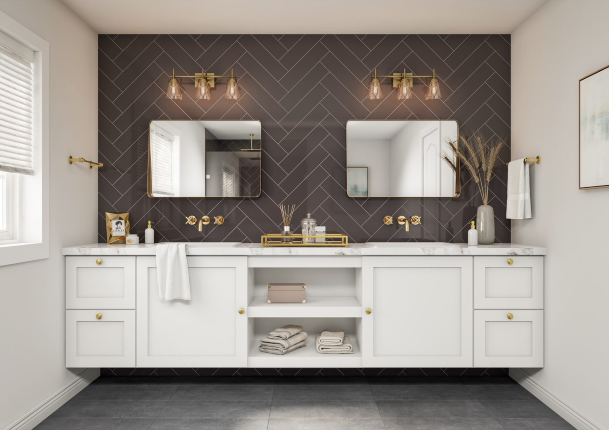 The popularity of porcelain tile continues to dominate the ceramic tile market; and for good reason. The new looks that literally mirror all types and textures of wood, stone and metals along with the superior technical properties make porcelain tile highly desired by customers for residential and commercial installations. For these reasons, porcelain tile is used in entryways, kitchens, food courts, showrooms, hallways, walls, bathrooms and certainly hotel lobbies.
The popularity of porcelain tile continues to dominate the ceramic tile market; and for good reason. The new looks that literally mirror all types and textures of wood, stone and metals along with the superior technical properties make porcelain tile highly desired by customers for residential and commercial installations. For these reasons, porcelain tile is used in entryways, kitchens, food courts, showrooms, hallways, walls, bathrooms and certainly hotel lobbies.
Tile contractors and their customers need to understand whether porcelain tile needs to be sealed and if so, why, when and with what type of sealer.
First, it is important to understand that there are two types of porcelain tile that need to be considered. They are glazed and unglazed. With glazed porcelain, there is not a need or benefit to using a sealer because the various types of glaze used to make this type of tile truly impervious. However, with unglazed porcelain tile, the use of a sealer may or not be needed for several reasons which we will discuss here.
Typically unglazed porcelain tile comes in polished and unpolished formats. The water absorption rating for porcelain tile, according to ANSI 137.1 and PTCA (Porcelain Tile Certification Agency) is .5% or less. This rating would put porcelain tile in the "Impervious" category. However, this can be misleading in some cases as some porcelain tiles will benefit from the use of a sealer due to the amount and more so the size of the pores left after the manufacturing process. Tiles that do have minimal absorption should not be viewed as having a weakness or flaw any more than many marbles and granites fall into this category on the stone side. On the other hand, some point to this rating or classification to suggest that all porcelain tile will never stain under any circumstance. This is not accurate.
In most cases, unglazed polished porcelain tile generally is the most susceptible to staining. This is due to the grinding or smoothing process used to polish the tiles which is the same as used for many natural stones. The use of abrasives takes what, under a microscope, looks rough and simply smooth’s it out to make light reflect more uniformly. This process opens up microscopic pinholes and pores in the tile that were not previously exposed.
Each factory will decide how to address this issue. Some will use nano-sealers to seal off this new porosity while others may apply a factory wax/ coating. We encourage you to ask any D&B Tile representative whether or not the tile you purchase has been treated with one of these systems before you decide to apply an additional sealer. Other factories will not treat the tile and recommend that a sealer be applied pre or post installation depending on the jobsite variables including possible contaminate exposure.
In the latter situation, the use of a penetrating sealer is recommended by most manufacturers and are based on the mockup testing results. If the tile is installed in a kitchen or food court area, be sure to use a premium stain repellant such as Aqua Mix "Sealer's Choice Gold" or Aqua Mix "UltraSolv." These are also recommended to seal the surrounding grout and will not change the appearance of the installation. One light application is normally recommended prior to grouting to prevent pigment staining of the tile, especially if a contrasting color is used.
To determine whether a particular tile will benefit from the use of a sealer, there are two methods that can be used. Contact the manufacturer or check their specifications and recommendations. A mockup test can also be performed and/or test with some uninstalled tiles with likely contaminants to the area in which the tile will be used. Testing should also include the grout to be used as the type and color (especially if contrasting) may stain. The time to find this out is not during or after the tile is installed.
By understanding the type of porcelain tile chosen, correctly identifying the need to seal, and lastly using the right sealer (if needed) will help the customer avoid some misunderstandings and potential pitfalls while providing years of beauty and satisfaction for all involved in the design, selling, installation and enjoyment of porcelain tile.
For answers to any questions, please contactour trained personnel at any of our nine tile showroon locations or authorized dealers in south Florida. Remember, "the first step to a beautiful design is walking into D&B Tile."


